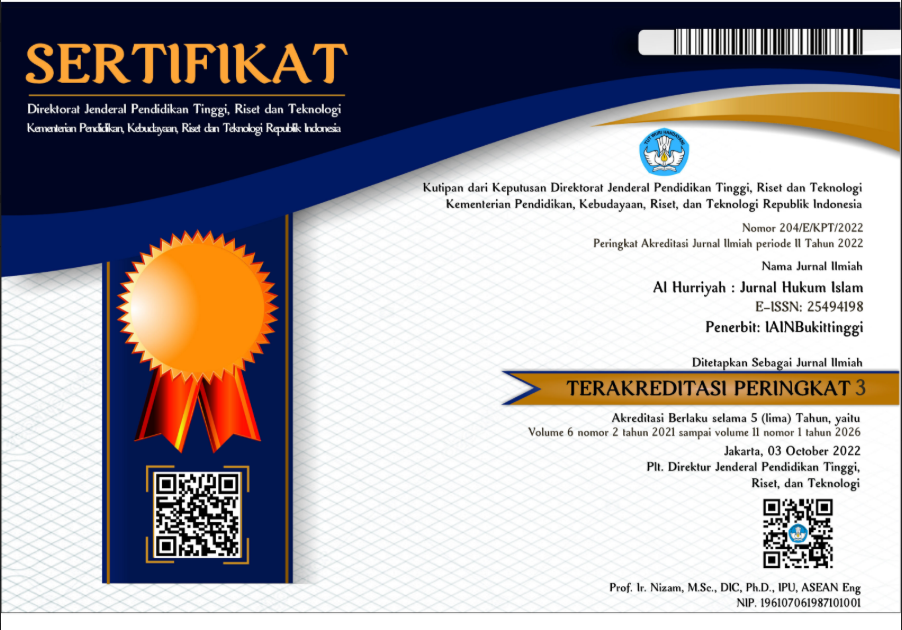Dynamics of Agency and Ideological Dominance: Constructing Female Identity in Radical Networks in Indonesia
DOI:
https://doi.org/10.30983/al-hurriyah.v10i1.7860Keywords:
Female Identity, Terorism, Radical Networks, IndonesiaAbstract
This study aims to examine how radical ideologies shape the construction of women’s identities and influence their perceptions of social roles in Indonesia. Using a qualitative descriptive approach, the research combines in-depth interviews with women involved in extremist networks and literature analysis to capture the social and psychological dimensions of their experiences. The findings reveal that radical ideologies provide alternative identity frameworks that differ from traditional narratives portraying women as passive or subordinate. Instead, these ideologies offer a sense of empowerment, belonging, and purpose, attracting women who feel marginalised or dissatisfied with their societal positions. The study also finds that women’s involvement in radical groups can simultaneously challenge patriarchal norms while reinforcing ideological control under extremist structures. This duality illustrates how radical movements reconstruct gender roles and redefine women’s participation in sociopolitical life. The research concludes that dissatisfaction with social inequality and the search for meaning are key drivers of women’s radicalisation. Therefore, understanding the identity dynamics within this process is crucial for developing effective gender-sensitive strategies to prevent extremism. The article contributes to the broader field of gender and radicalisation studies by providing empirical insights into how women negotiate power, identity, and ideology in the context of Indonesian society.
This study aims to determine the position of women as witnesses in Islam. Islam as a religion has legal principles that define women's roles and responsibilities in various areas of life, including as witnesses in Islamic law. This study examines the Islamic view of women as witnesses, evaluates the legal norms governing women's participation in testimony, and analyzes the application of these principles in Islamic jurisprudence. The research method analyzes classical Islamic texts such as the Quran and Hadith to understand the legal basis of women's testimonial role. In addition, the research also examines the various interpretations that have emerged on this topic in the Islamic tradition. The results of this study can provide a deeper understanding of whether the status of women as Islamic witnesses is in accordance with the principles of gender justice and equality and how the concept is implemented in contemporary Islamic jurisprudence. This research is expected to contribute to the literature on the role of women in the Islamic legal system, provide a balanced view on gender issues in the context of testimony and provide a discussion on the importance of Islamic values in the legal system of Islamic values in modern society.
References
Journal
Abay Gaspar, Hande, Christopher Daase, Nicole Deitelhoff, Julian Junk, and Manjana Sold. “Radicalization and Political Violence – Challenges of Conceptualizing and Researching Origins, Processes and Politics of Illiberal Beliefs.” International Journal of Conflict and Violence (IJCV), September 17, 2020, 1-18 Pages. https://doi.org/10.4119/IJCV-3802.
Araque, Oscar, and Carlos A. Iglesias. “An Approach for Radicalization Detection Based on Emotion Signals and Semantic Similarity.” IEEE Access 8 (2020): 17877–91. https://doi.org/10.1109/ACCESS.2020.2967219.
Arifianto, Alexander R. “Islamic Campus Preaching Organizations in Indonesia: Promoters of Moderation or Radicalism?” Asian Security 15, no. 3 (September 2, 2019): 323–42. https://doi.org/10.1080/14799855.2018.1461086.
Atari, Mohammad, Aida Mostafazadeh Davani, Drew Kogon, Brendan Kennedy, Nripsuta Ani Saxena, Ian Anderson, and Morteza Dehghani. “Morally Homogeneous Networks and Radicalism.” Social Psychological and Personality Science 13, no. 6 (August 2022): 999–1009. https://doi.org/10.1177/19485506211059329.
Bressanelli, Edoardo, and Margherita de Candia. “Fratelli d’Italia in the European Parliament: Between Radicalism and Conservatism.” Contemporary Italian Politics 17, no. 1 (January 2, 2025): 61–80. https://doi.org/10.1080/23248823.2023.2285545.
Cartledge, Yianni. “Beyond the ‘Red Rock’: The Ikarian Revolution (1912), Political Radicalism, and the Ikarian Diaspora.” Labor History 66, no. 5 (September 3, 2025): 659–77. https://doi.org/10.1080/0023656X.2024.2428681.
Carter, Elisabeth. “Right-Wing Extremism/Radicalism: Reconstructing the Concept.” Journal of Political Ideologies 23, no. 2 (May 4, 2018): 157–82. https://doi.org/10.1080/13569317.2018.1451227.
Davids, Nuraan. “Islam, Moderation, Radicalism, and Justly Balanced Communities.” Journal of Muslim Minority Affairs 37, no. 3 (July 3, 2017): 309–20. https://doi.org/10.1080/13602004.2017.1384672.
Dean, Rikki John. “Beyond Radicalism and Resignation: The Competing Logics for Public Participation in Policy Decisions.” Policy & Politics 45, no. 2 (April 2017): 213–30. https://doi.org/10.1332/030557316X14531466517034.
Dioum, Mor, Stephanie Yorath, and Sophie Shall. “Radicalism and Child Protection: Working with the Community.” Critical and Radical Social Work 13, no. 2 (April 2025): 195–205. https://doi.org/10.1332/20498608Y2024D000000068.
Er-Rifaiy, Amina, and Khalid Mouna. “‘Combating’ Violent Radicalism in the Moroccan Context: When the State Monopolizes the Religious.” Journal of Regional Security 20, no. 1 (2025): 123–42. https://doi.org/10.5937/jrs20-57666.
Erskine, Samantha E., and Diana Bilimoria. “White Allyship of Afro-Diasporic Women in the Workplace: A Transformative Strategy for Organizational Change.” Journal of Leadership & Organizational Studies 26, no. 3 (August 2019): 319–38. https://doi.org/10.1177/1548051819848993.
Flores, Nelson. “A Tale of Two Visions: Hegemonic Whiteness and Bilingual Education.” Educational Policy 30, no. 1 (January 2016): 13–38. https://doi.org/10.1177/0895904815616482.
Garrett, Paul Michael, and Teresa Francesca Bertotti. “Social Work and the Politics of ‘Austerity’: Ireland and Italy.” European Journal of Social Work 20, no. 1 (January 2, 2017): 29–41. https://doi.org/10.1080/13691457.2016.1185698.
Ghosh, Ratna, W.Y. Alice Chan, Ashley Manuel, and Maihemuti Dilimulati. “Can Education Counter Violent Religious Extremism?” Canadian Foreign Policy Journal 23, no. 2 (May 4, 2017): 117–33. https://doi.org/10.1080/11926422.2016.1165713.
Gomez, Raul, Laura Morales, and Luis Ramiro. “Varieties of Radicalism: Examining the Diversity of Radical Left Parties and Voters in Western Europe.” West European Politics 39, no. 2 (March 3, 2016): 351–79. https://doi.org/10.1080/01402382.2015.1064245.
Guerra, Nicola. “Far-Right European Foreign Fighters in the Yugoslav and Ukraine Wars. Ideological and Geopolitical Implications between Westernist and Eurasianist Radicalisms.” European Politics and Society 26, no. 3 (May 27, 2025): 611–40. https://doi.org/10.1080/23745118.2024.2387762.
———. “The Link between Right-Wing Political Radicalism and Geopolitical Action. The Yugoslav Wars and the Action of the Opposing Factions of the European Extreme Right.” Critical Studies on Terrorism 18, no. 1 (January 2, 2025): 295–323. https://doi.org/10.1080/17539153.2024.2435701.
Hansen, William. “Boko Haram: Religious Radicalism and Insurrection in Northern Nigeria.” Journal of Asian and African Studies 52, no. 4 (June 2017): 551–69. https://doi.org/10.1177/0021909615615594.
Herro, Annie, and Franklin Obeng-Odoom. “Foundations of Radical Philanthropy.” VOLUNTAS: International Journal of Voluntary and Nonprofit Organizations 30, no. 4 (August 2019): 881–90. https://doi.org/10.1007/s11266-019-00136-1.
Hew, Wai Weng. “THE ART OF DAKWAH : Social Media, Visual Persuasion and the Islamist Propagation of Felix Siauw.” Indonesia and the Malay World 46, no. 134 (January 2, 2018): 61–79. https://doi.org/10.1080/13639811.2018.1416757.
Jugend, Daniel, Charbel Jose Chiappeta Jabbour, Janaina A. Alves Scaliza, Robson Sø Rocha, José Alcides Gobbo Junior, Hengky Latan, and Manoel Henrique Salgado. “Relationships among Open Innovation, Innovative Performance, Government Support and Firm Size: Comparing Brazilian Firms Embracing Different Levels of Radicalism in Innovation.” Technovation 74–75 (June 2018): 54–65. https://doi.org/10.1016/j.technovation.2018.02.004.
Karell, Daniel, and Michael Freedman. “Rhetorics of Radicalism.” American Sociological Review 84, no. 4 (August 2019): 726–53. https://doi.org/10.1177/0003122419859519.
Kelan, Elisabeth K., and Patricia Wratil. “Post‐Heroic Leadership, Tempered Radicalism and Senior Leaders as Change Agents for Gender Equality.” European Management Review 15, no. 1 (March 2018): 5–18. https://doi.org/10.1111/emre.12117.
Lauriola, Marco, Renato Foschi, and Luca Marchegiani. “Integrating Values and Cognitive Style in a Model of Right-Wing Radicalism.” Personality and Individual Differences 75 (March 2015): 147–53. https://doi.org/10.1016/j.paid.2014.11.028.
Lee, Francis L. F. “Internet Alternative Media, Movement Experience, and Radicalism: The Case of Post-Umbrella Movement Hong Kong.” Social Movement Studies 17, no. 2 (March 4, 2018): 219–33. https://doi.org/10.1080/14742837.2017.1404448.
Lee, Francis L. F., Hai Liang, Edmund W. Cheng, Gary K. Y. Tang, and Samson Yuen. “Affordances, Movement Dynamics, and a Centralized Digital Communication Platform in a Networked Movement.” Information, Communication & Society 25, no. 12 (September 10, 2022): 1699–1716. https://doi.org/10.1080/1369118X.2021.1877772.
Lobato, Roberto M., Miguel Moya, Manuel Moyano, and Humberto M. Trujillo. “From Oppression to Violence: The Role of Oppression, Radicalism, Identity, and Cultural Intelligence in Violent Disinhibition.” Frontiers in Psychology 9 (August 20, 2018): 1505. https://doi.org/10.3389/fpsyg.2018.01505.
Macdougall, Alex I., Jaap Van Der Veen, Allard R. Feddes, Lars Nickolson, and Bertjan Doosje. “Different Strokes for Different Folks: The Role of Psychological Needs and Other Risk Factors in Early Radicalisation.” Edited by Herbert Scheithauer, Vincenz Leuschner, Nils Böckler, Babak Akhgar, and Holger Nitsch. International Journal of Developmental Science 12, no. 1–2 (September 5, 2018): 37–50. https://doi.org/10.3233/DEV-170232.
Margiansyah, Defbry, M. Hamdan Basyar, Dhurorudin Mashad, Muhammad Fakhry Ghafur, and Nostalgiawan Wahyudhi. “Beyond Radicalism: Islamist Attitudes and Democratic Support in Indonesia.” SAGE Open 15, no. 3 (July 30, 2025). https://doi.org/10.1177/21582440251378287.
Massetti, Emanuele, and Arjan H Schakel. “Between Autonomy and Secession: Decentralization and Regionalist Party Ideological Radicalism.” Party Politics 22, no. 1 (January 2016): 59–79. https://doi.org/10.1177/1354068813511380.
Mietzner, Marcus, and Burhanuddin Muhtadi. “Explaining the 2016 Islamist Mobilisation in Indonesia: Religious Intolerance, Militant Groups and the Politics of Accommodation.” Asian Studies Review 42, no. 3 (July 3, 2018): 479–97. https://doi.org/10.1080/10357823.2018.1473335.
Minkenberg, Michael. “Between Party and Movement: Conceptual and Empirical Considerations of the Radical Right’s Organizational Boundaries and Mobilization Processes.” European Societies 21, no. 4 (August 8, 2019): 463–86. https://doi.org/10.1080/14616696.2018.1494296.
Misdah, Asep Iwa Soemantri, Sumin Sumin, Muh Barid Nizarudin Wajdi, and Muhamad Imam Pamungkas. “Religious Leadership and Personal Branding of ‘Kyai’ in Islamic Education Management: Pathways to Promoting Moderation and Preventing Radicalism.” Munaddhomah: Jurnal Manajemen Pendidikan Islam 6, no. 1 (March 16, 2025): 122–38. https://doi.org/10.31538/munaddhomah.v6i1.1510.
Molnár, Virág. “Civil Society, Radicalism and the Rediscovery of Mythic Nationalism.” Nations and Nationalism 22, no. 1 (January 2016): 165–85. https://doi.org/10.1111/nana.12126.
Montgomery, David W., and John Heathershaw. “Islam, Secularism and Danger: A Reconsideration of the Link between Religiosity, Radicalism and Rebellion in Central Asia.” Religion, State and Society 44, no. 3 (July 2, 2016): 192–218. https://doi.org/10.1080/09637494.2016.1220177.
Muzanenhamo, Penelope, and Rashedur Chowdhury. “Epistemic Injustice and Hegemonic Ordeal in Management and Organization Studies: Advancing Black Scholarship.” Human Relations 76, no. 1 (January 2023): 3–26. https://doi.org/10.1177/00187267211014802.
O’Hara, Kieron, and David Stevens. “Echo Chambers and Online Radicalism: Assessing the Internet’s Complicity in Violent Extremism.” Policy & Internet 7, no. 4 (December 2015): 401–22. https://doi.org/10.1002/poi3.88.
Opozda-Suder, Sylwia, Agata Łopatkiewicz, and Małgorzata Michel. “The Activism and Radicalism Intention Scales (ARIS) as a Measure of Political Mobilization: Verification of Factor Structure and Invariance across Gender in a Sample of Polish Academic Youth.” Terrorism and Political Violence 37, no. 4 (May 19, 2025): 458–77. https://doi.org/10.1080/09546553.2024.2308795.
Pajarianto, Hadi, Imam Pribadi, and Puspa Sari. “Tolerance between Religions through the Role of Local Wisdom and Religious Moderation.” HTS Teologiese Studies / Theological Studies 78, no. 4 (January 1, 2022). https://doi.org/10.4102/hts.v78i4.7043.
Peci, Lulzim. “Influence of Drivers of Radicalism and Violent Extremism at Macro and Meso Levels: The Case of Kosovo.” Journal of Regional Security 20, no. 1 (2025): 23–48. https://doi.org/10.5937/jrs20-44184.
Perez, Nahshon. “Data Based Radicalism? Data Usage and the Problem of Critical Distance in Contextual and Empirical Political Theory.” Critical Review of International Social and Political Philosophy 28, no. 4 (June 7, 2025): 527–49. https://doi.org/10.1080/13698230.2022.2121519.
Pizzolato, Nico. “Reconceptualising the Factory as Plantation.” Historical Materialism 33, no. 1 (December 11, 2024): 210–39. https://doi.org/10.1163/1569206x-bja10062.
Richter, Jennifer, Flóra Faragó, Beth Blue Swadener, Denisse Roca‐Servat, and Kimberly A. Eversman. “Tempered Radicalism and Intersectionality: Scholar‐activism in the Neoliberal University.” Journal of Social Issues 76, no. 4 (December 2020): 1014–35. https://doi.org/10.1111/josi.12401.
Riofrancos, Thea. “Extractivismo Unearthed: A Genealogy of a Radical Discourse.” Cultural Studies 31, no. 2–3 (May 4, 2017): 277–306. https://doi.org/10.1080/09502386.2017.1303429.
Rollwage, Max, Raymond J. Dolan, and Stephen M. Fleming. “Metacognitive Failure as a Feature of Those Holding Radical Beliefs.” Current Biology 28, no. 24 (December 2018): 4014-4021.e8. https://doi.org/10.1016/j.cub.2018.10.053.
Rooduijn, Matthijs, and Tjitske Akkerman. “Flank Attacks: Populism and Left-Right Radicalism in Western Europe.” Party Politics 23, no. 3 (May 2017): 193–204. https://doi.org/10.1177/1354068815596514.
Rooduijn, Matthijs, and Brian Burgoon. “The Paradox of Well-Being: Do Unfavorable Socioeconomic and Sociocultural Contexts Deepen or Dampen Radical Left and Right Voting Among the Less Well-Off?” Comparative Political Studies 51, no. 13 (November 2018): 1720–53. https://doi.org/10.1177/0010414017720707.
Rooduijn, Matthijs, Brian Burgoon, Erika J Van Elsas, and Herman G Van De Werfhorst. “Radical Distinction: Support for Radical Left and Radical Right Parties in Europe.” European Union Politics 18, no. 4 (December 2017): 536–59. https://doi.org/10.1177/1465116517718091.
Silver, Daniel. “Everyday Radicalism and the Democratic Imagination: Dissensus, Rebellion and Utopia.” Politics and Governance 6, no. 1 (April 3, 2018): 161–68. https://doi.org/10.17645/pag.v6i1.1213.
Sovacool, Benjamin K, Noam Bergman, Debbie Hopkins, Kirsten Eh Jenkins, Sabine Hielscher, Andreas Goldthau, and Brent Brossmann. “Imagining Sustainable Energy and Mobility Transitions: Valence, Temporality, and Radicalism in 38 Visions of a Low-Carbon Future.” Social Studies of Science 50, no. 4 (August 2020): 642–79. https://doi.org/10.1177/0306312720915283.
Subchi, Imam, Zulkifli Zulkifli, Rena Latifa, and Sholikatus Sa’diyah. “Religious Moderation in Indonesian Muslims.” Religions 13, no. 5 (May 17, 2022): 451. https://doi.org/10.3390/rel13050451.
Suharto, Toto. “Transnational Islamic Education in Indonesia: An Ideological Perspective.” Contemporary Islam 12, no. 2 (July 2018): 101–22. https://doi.org/10.1007/s11562-017-0409-3.
Turri, John. “The Radicalism of Truth‐insensitive Epistemology: Truth’s Profound Effect on the Evaluation of Belief.” Philosophy and Phenomenological Research 93, no. 2 (September 2016): 348–67. https://doi.org/10.1111/phpr.12218.
Svenungsson, Jayne. “Prophetic Political Theology.” Nordisk Judaistik/Scandinavian Jewish Studies 36, no. 1 (July 1, 2025). https://doi.org/10.30752/nj.156756.
Tanshzil, Sri Wahyuni, Karim Suryadi Suryadi, Kokom Komalasari, and Leni Anggraeni. “Radicalism in the Age of Digital Technology: A Bibliometric Study.” Journal of Advanced Research in Applied Sciences and Engineering Technology 50, no. 2 (August 25, 2024): 18–29. https://doi.org/10.37934/araset.50.2.1829.
Van Prooijen, Jan-Willem, and André P. M. Krouwel. “Extreme Political Beliefs Predict Dogmatic Intolerance.” Social Psychological and Personality Science 8, no. 3 (April 2017): 292–300. https://doi.org/10.1177/1948550616671403.
Vegetti, Federico, and Levente Littvay. “Belief in Conspiracy Theories and Attitudes toward Political Violence.” Italian Political Science Review/Rivista Italiana Di Scienza Politica 52, no. 1 (March 2022): 18–32. https://doi.org/10.1017/ipo.2021.17.
Interviews
D, U. Personal Interview, June 28, 2024.
N, Y. Personal Interview, June 26, 2024.
V, N. Personal interview, June 25, 2024.
Y, I. Personal Interview, June 25, 2024.
Downloads
Published
How to Cite
Issue
Section
Citation Check
License
Copyright (c) 2025 Ikhwanuddin Abdul Majid, Valensius Ngardi, Utama Wardi, Sahrul Sori Alom Harahap, Nur Afdhal

This work is licensed under a Creative Commons Attribution-ShareAlike 4.0 International License.
Authors who publish with this journal agree to the following terms:
- Authors retain copyright and grant the journal right of first publication with the work simultaneously licensed under a Creative Commons Attribution-ShareAlike 4.0 International License that allows others to share the work with an acknowledgment of the work's authorship and initial publication in this journal.
- Authors are able to enter into separate, additional contractual arrangements for the non-exclusive distribution of the journal's published version of the work (e.g., post it to an institutional repository or publish it in a book), with an acknowledgment of its initial publication in this journal.
- Authors are permitted and encouraged to post their work online (e.g., in institutional repositories or on their website) prior to and during the submission process, as it can lead to productive exchanges, as well as earlier and greater citation of published work (See The Effect of Open Access).





